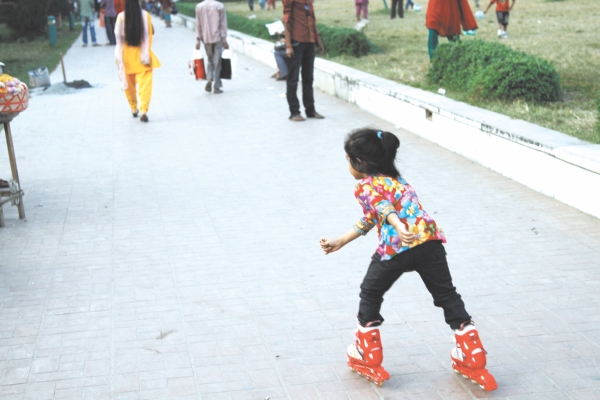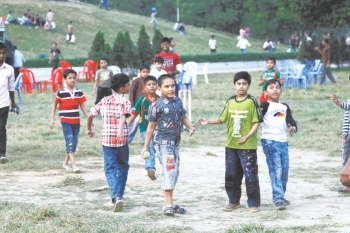| Home - Back Issues - The Team - Contact Us |
 |
| Volume 11 |Issue 01| January 06, 2012 | |
|
|
Lifestyle
The Importance of Play Mahtabi Zaman Sabbir, Shanto, Jewel, Rony and Mukul are teenagers who live in Dania, Jatrabari, a peripheral area of south Dhaka. This area is so densely populated that people spare no space on their land after constructing a building for a garden or a playground. As a result, the children have no space for playing or any physical activity, which is every child's right. This situation is not specifically true for Jatrabari, it is the overall situation of Dhaka. Before winter arrived, these children would pass their leisure time by gossiping, sitting on a short wall, about waist high, near their homes. They could not play on the vacant plot nearby, because the surface of the land was uneven, and water had seeped into the potholes in the ground. Some people had inconsiderately dumped rubble and garbage there. So these young boys passed their leisure time by breaking windows of other houses by throwing pebbles at them and often they stole guavas, green coconuts, papayas or mangos from the trees on the plot, becoming a nuisance for the land owner. By the time winter arrived, these boys were so desperate for something to do, they started playing badminton on the plot, ignoring the condition of the land. After a few days they decided to even out the ground so they could use the whole plot. They all chipped in some money in order to do this and hired some day labourers. They used the debris and garbage dumped on the land to fill up the potholes. Later, they covered these with soil and finally with sand to make the ground smoother. They bought a badminton net and managed to get some lights to see better when they played at night. All this effort clearly showed their need for space to play.
Unfortunately, a majority of the children residing in Dhaka are not so lucky. Children of this age group usually spend their time in schools or coaching centres. Their leisure time is spent walking on the streets, watching TV, playing video games, on the computer browsing the net, reading books and their open space is limited to their verandas or rooftops. Even rooftops are often off limits for some children, especially if they live in a rented apartment. The only contact children do have with nature is when they stare wistfully out their windows or from their verandas at the few plants that are still standing on the roads crowded with cars and buildings. On this issue, Assistant Professor of the Psychology department of Bangabandhu Sheikh Mujib Medical University (BSMMU), Dr Sultana Algin says, "Deviation from nature hampers a child's inner sight and creativity. The experience of seeing dewdrops on a shuily (flower) that has fallen on the grass cannot be compared to watching a similar scene on TV. As a result, there are big gaps in the development of a child's mind." According to Dr Algin, when children cannot play games outdoors or get enough exercise, they face different kinds of physical and mental problems. First of all, the growth hormone responsible for a child's proper physical growth, is not released adequately for the lack of physical activity. Second, children feel happy while playing with others, because playing is fun and it helps them to interact with others. This happiness from playing freely outdoors has a positive influence on their physical growth and makes them healthy. Third, playing with other children is a medium of socialisation for a child. If children do not get the opportunity to do this they do not develop proper social skills. As a result, they often face problems making friends at school, college and university and in their marital life because they cannot adjust with their partner. This makes them self centred and intolerant. Fourth, stuck in the confinement of their homes with the TV on, children develop optical problems and they gain excessive weight resulting in diabetes and heart problems early on in life. Sleep disorders can also occur since these children do not burn adequate energy and therefore do not feel as tired, as they should. Fifth when both the parents are working and do not give their children quality time, they can become easy prey for depression, frustration and all kinds of addictions. On the other hand, if the mothers are homemakers, children become more demanding and dependent on them. At one stage continuous nagging makes the mother intolerant and their relationship is negatively affected. A recent research shows that, open space, parks and playgrounds in Dhaka have dramatically decreased. According to "Environment of Capital Dhaka," a book published by the Asiatic Society of Bangladesh to celebrate 400 years of Dhaka as the capital, in 1959 open space, parks and playgrounds constituted 443 acres of Dhaka. There were 71 parks, 21 playgrounds and the total land area for open space was 229.461 acres in 1990. According to the land use data obtained from the draft DAP (Detailed Area Plan) in 2004, around 221.92 acres of land was identified as open space in the DCC (Dhaka City Corporation) area, while the total DCC area is 361762.277784 acres. Urban expert and chairman at the Centre for Urban Studies (CUS) Professor Nazrul Islam says, "Including forest and hilly areas, open space of a city should be from 10 to 20 percent of its total area." The open space in Dhaka is 0.061 per cent according to the latest data figured out for DCC's total area and area of its open space. Hong Kong, which is considered the most crowded city in the world, has 40 percent open space including its hills, forest, parks, and playgrounds. Cities are developed in two ways. One is a planned city and the other one is developed spontaneously or an unplanned city, says Professor Nazrul. "Like other cities of Bangladesh, Dhaka was also developed spontaneously,” says Nazrul. “Along with many facilities of a city, an ideal city has recreation space for all. Children, women, aged and handicapped people are given special consideration while planning recreation facilities." An ideal city has four categories of playgrounds for its population. Play lots or Neighbourhood Parks are for kids is the first category. These are small parks with a touch of nature. The second category is the community playground, used for playing football or cricket etc. The third category is called the regional playground made for a specific region of the city and the last category is called a national playground made for the whole population of the city. Professor Nazrul says, "The sad part is that, although these requirements for an ideal city are incorporated in city planning, their implementation cannot be seen. We always deviate from the original plan." Is it possible to create playgrounds and parks for the children in such an unplanned and densely populated city like Dhaka? To answer this question Professor Nazrul says, "If sincerely and honestly done, it is of course possible. Establishment of schools, colleges, shopping malls, private universities, mosques and extension of mosques is not stopped due to scarcity of land in Dhaka, so, why should there be objections to parks and play grounds?" Steps can be taken both in public and private initiatives. The government can do this by using abandoned property. If there are any playgrounds in the neighbourhood schools and colleges, they can be opened up for the local children whenever it is convenient. "If the government and general people are aware about the need of playgrounds they can come up with many innovative solutions," concludes Professor Nazrul Islam.
Copyright
(R) thedailystar.net 2012 |

